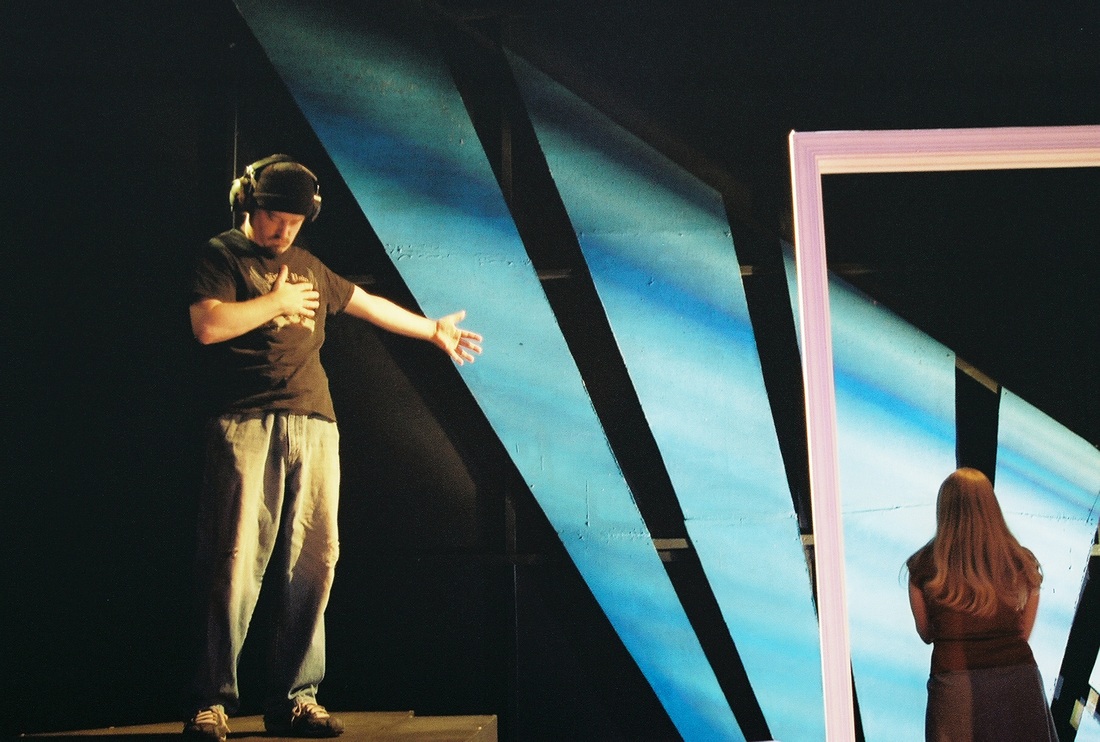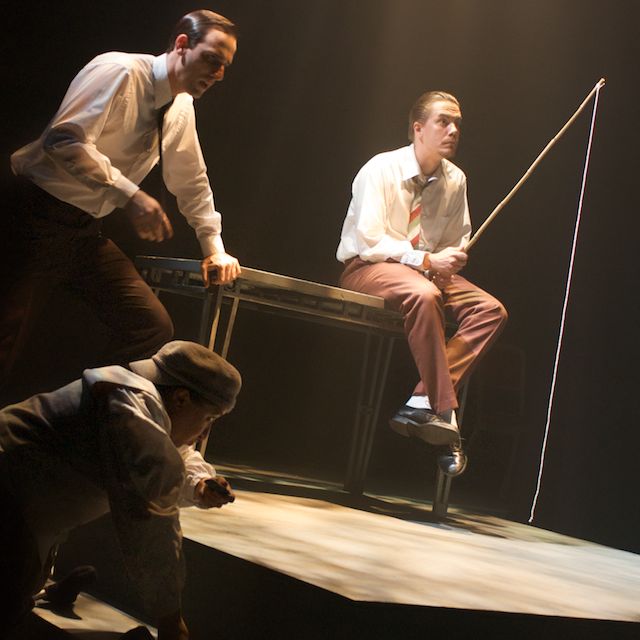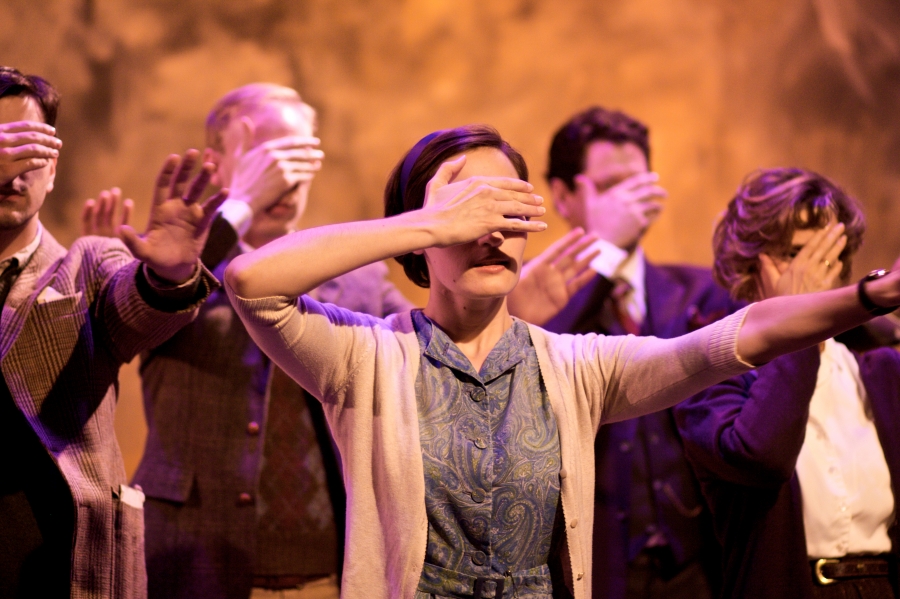|
Jacqueline Lawton: How long have you lived and worked as a playwright in DC? What brought you here? Why have you stayed?
Kathleen Akerley: I've been a DC-area resident since I was 2; had my first play produced (in the original Source Festival) in 1999 then didn't write for several years. I started participating as a writer in eXtreme eXchange in 2006; produced my own play Theories of the Sun in 2008 and have been writing steadily ever since. I've stayed because my progress has been overlapping; that is, whenever I was developing something that might have taken me out of the area to explore I was doing it on a foundation of something else supportive and steady. But I am currently giving some thought to leaving. JL: Have you ever been a member of a DC area playwrights writing group? If so, did you find it useful? Would you recommend that other playwrights join them? KA: I'm a member of a playwriting collective called Lizard Claw that has been incredibly useful to me but very few of the members are local. JL: In DC, we have the Capital Fringe Festival, the Intersection Festival, the Source Theatre Festival, the Kennedy Center's Page-to-Stage Festival, the Black Theater Festival, and the Hip Hop Theatre Festival. We also have the Mead Lab at Flashpoint Theater Lab Program. Have you participated in any of these? If so, can you speak about your experience? KA: I collaborated with Scot MacKenzie and Dan Istrate on a CapFringe piece (and have also directed a CapFringe piece, by NY-based playwright Callie Kimball); I had a one-act in the original Source Festival (Banquo's Dead, Jim) had a 10-minute play (Feet) in the new Source Festival as well as worked on one of their artistic mash-ups (. . . listening) as well as wrote for their 24-hour new play arm (1,952 Miles); and I was once granted a slot in the Mead Lab program (that I did not, ultimately, use -- but that was as a director, not a playwright). The Source work has been the most writerly, so if I don't discuss the others that's not a tactful omission! I am all praise for the Source Festival: even in change of leadership the goals seem to have remained to include as many local artists in as many ways as possible. I had some frustrations with some of the processes, but no more than would be likely on any new play project. JL: What kind of work do you do to pay the bills? How do you balance this work with your writing? KA: I work part-time in an office job that is incredibly flexible -- they even let me take leave without pay for a month to go direct a play in Belfast. I also make a little money over a year from freelance directing, acting and teaching. I just finished my training to be a massage therapist and hope to be certified by October: I am very lucky in this regard that I have maintained for years employment that is steady but not consuming and hence I can build writing time into my schedule. JL: How many plays have you had produced in the DC area? Were any of these plays self-produced? If so, where and what did you learn from that experience? KA: Counting festivals etc. and NOT counting readings (my take on 'produced'), 16. Four were self-produced -- all at my own company Longacre Lea. I think I may be guilty of never learning from experience! I can't think of an answer to the final part of this question. JL: If you could be produced at any theatre in DC, which would it be and why? KA: Not to be evasive but this answer really depends on which of my plays is a the forefront of my mind. I've currently got several in that waiting-to-cohere mode of being semi-outlined and with half-written scenes on the back of an envelope blah blah: if I imagine any of them being staged the one that makes sense at Theater Alliance doesn't make as much sense at Forum, the Woolly is odd at WSC and vice versa, and so on. A particular one of these it would have been my drop-dead dream to get into the hands of Joy Zinoman, because of her unmatched capacity for the beat work of human details in degrading circumstances: this is why you have to get plays written because otherwise people retire and there goes that fantasy. JL: DC audiences are ... KA: uh. 'Cake or death?' JL: DC actors, designers and directors are .. KA: 'So my choices are . . . "or death?"' JL: DC critics are ... KA: OK, as to this question and the two preceding questions [grin]: maybe I don't learn from experience because I am artistically insular and egomaniacal, maybe I am a self-producing a(uteur)-hole, but if I have a good point it's that I don't over-generalize about classes of people. There's a critic in this town who could easily switch to directing and have the respect of everyone he cast, another who many of us read only because battling an apoplectic fit can be funny when you do it with friends. And so on as to audience, actors, designers, directors, playwrights . . . JL: How do you feel the DC theatre community has addressed the issues of race and gender parity ? How has this particular issue impacted you and your ability to get your work produced on the main stages? KA: Yeah, I'm not qualified to answer this one because of the schism in my brain that causes me never to see myself as part of a socio-political whole. JL: What advice do you have for an up and coming DC based playwright or a playwright who has just moved to D.C.? KA: I don't have any DC based advice: I have the networking/business skills of a concussed vole. If my general advice to anyone is at all pertinent to them, I'd go for the old Bene Gesserit maxim: Exposition is the mind-killer. Exposition is the little-death that brings total obliteration. JL: What's next for you as a playwright? Where can we keep up with your work? KA: My play Goldfish Thinking is up right now at the Callan Theatre, until 9 September. To learn more about Longacre Lea, follow this link: www.longacrelea.org
0 Comments
Your comment will be posted after it is approved.
Leave a Reply. |
My BlogI'm a playwright, dramaturg, and teaching artist. It is here where you'll find my queries and musings on life, theater and the world. My posts advocate for diversity, inclusion, and equity in the American Theatre and updates on my own work. Please enjoy!
Categories
All
Archives
June 2020
Reading List
|



